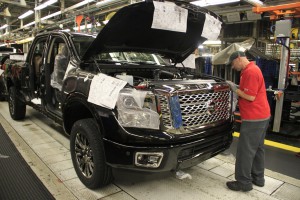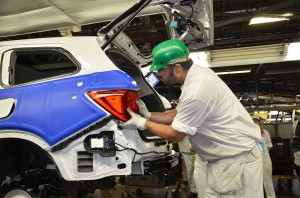
Employees at Nissan's Canton, Mississippi, plant and other Japanese-owned U.S. plants could see their jobs threatened by new tariffs, Japan warned on Friday.
The Japanese government is the latest to weigh in on the potential dangers posed by the Trump Administration’s threatened trade tariffs on not only the global economy but U.S. jobs.
Warning that the White House’s proposed 25% tariff puts global free trade “at great risk,” a report issued by the Japanese government on Friday said such a move could backfire, threatening to “eventually undermine the entire U.S. economy” by, among other things costing the jobs of hundreds of thousands of U.S. jobs.
The Japanese report echoed the findings of another analysis of the auto tariffs’ impact, the Peterson Institute for International Economics estimating that anywhere from 195,000 to as many as 624,000 U.S. jobs could be lost, the higher figure reflecting what would happen if trade partners retaliate.
That is already happening in response to the imported steel and aluminum tariffs the Trump Administration previously enacted, and there are growing signs of a negative impact on jobs. Earlier this week, Harley-Davidson announced it may soon move some of its motorcycle production abroad to avoid what it said will be a $2,200 increase in the price of its products in Europe due to new EU counter-sanctions. Other companies dependent on foreign aluminum and steel are warning of similar concerns, Missouri’s Mid-Continent Nail Corporation warning it is “on the brink of extinction.”

Honda is one of America's largest auto exports, its Alabama plant producing global models like the new Odyssey minivan.
(Car dealers call tariffs a “tax on consumers.” Click Here for the story.)
Japan told the World Trade Organization it is ready to fight back against both the steel and aluminum tariffs, as well as the threatened 25% duties on its imported vehicles, considering a new 50 billion yen, or $450 million, countermeasure of its own against American-made goods.
The new Japanese report states that, “broad trade restriction measures on automobiles and auto parts in the name of security raise serious questions about (U.S.) compliance with the WTO agreements.”
Then-candidate Donald Trump made trade, especially involving the auto industry, a cornerstone of his campaign for the White House. Early on, however, he focused on domestic manufacturers, particularly Ford, for shifting production to Mexico. That issue is one of the topics the administration wants to address as part of its efforts to renegotiate the North American Free Trade Agreement.
Trump later took aim at Toyota and other foreign automakers. Japan’s largest car company this week estimated that if the new tariffs go into effect the price of its long-popular Camry sedan could jump $1,800, even though it is assembled in the U.S. That’s because it still uses a significant amount of imported componentry.
(Automakers foreign and domestic: tariffs harm jobs, economy. Click Here for the story.)
Overall, the Alliance of Automobile Manufacturers, a trade group including both domestic and import car companies, this week estimated the price of the average vehicle sold in the U.S. could rise by $5,800 if the tariffs are enacted.

Toyota has warned it may have to raise the price of even the American-made Camry by $1,800 if tariffs are enacted.
Both domestic manufacturers, such as General Motors and Ford, as well as foreign carmakers warn they will be impacted. And higher vehicle prices are just part of their concern. The U.S. has been gaining ground as a vehicle exporter, ironically, as the result of the same globalization strategies that the Trump Administration has decried. Volvo, for example, this month opened up its first U.S. plant, and the Charleston, South Carolina facility will become the only worldwide source for some of its models.
Currently, the biggest automotive exporter is BMW, using its own South Carolina plant. Mercedes-Benz and Honda follow close behind.
(Click Here to see how “nearly every segment of auto industry” is threatened by Trump trade tactics.)
To ease early trade frictions in the 1980s, Japanese carmakers, such as Toyota and Honda, started setting up U.S. plants, while also accepting “voluntary” restraints on imports. Today, the vast majority of Japanese-branded cars, trucks and crossovers are assembled in the U.S., that country’s automakers so far investing $48 billion in Stateside assembly and components plants, according to the new Japanese report.
It warned that a sizable number of workers at those production facilities, as well as at Japanese brand dealerships and logistics centers could also lose their jobs if the tariffs are enacted.
The Japanese have some history to point to in support of their concerns. While the launch of production in the U.S. has created hundreds of thousands of American jobs since the 1980s, the Voluntary Restraint Agreement, or VRA, Japan enacted more than three decades ago is widely blamed for driving up American car prices by thousands of dollars, as well.

Japanese automakers going to have it tough? Too bad. Ask some of the hundreds of thousands of American workers who had lost their jobs in the 70’s and 80’s if they give a crap about a country that had been playing the “We can export out of, but not import into Japan” game for decades. F japan and Korea. You’re getting the same back as you’ve given.
Not to get political, Dave, but realize that there are now more than 500,000 people in the U.S. working for Japanese carmakers, many of whom could loose jobs. BMW is now indicating it may cut work and investments at its plant in SC. Oh, and do be aware that BMW, Honda and Mercedes are the largest exporters of American-made cars, so losing foreign markets won’t be a good thing. That’s simply a hit to the American economy and jobs. Meanwhile, raising prices on ALL American vehicles (yep, including GM, Ford and FCA) by an estimated $5,000+ will translate into big problems, not only higher costs for consumers but likely a million or more fewer vehicle sales. So, more lost jobs and an even weaker economy. Oh, and higher new vehicle prices usually translate into a big jump in used vehicle pricing, as well. This is not a good scenario for anyone, which is why even domestic makers are worrying, as are many conservative economists.
Paul E.